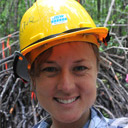
LIMA, Peru—Responses to a survey about community forest monitoring and benefit sharing highlight some of the controversies and philosophical sticking points of REDD+, panelists said on the sidelines of the UNFCCC climate conference in Lima, Peru.
REDD+—short for Reducing Emissions from Deforestation and forest Degradation—aims to compensate tropical countries for keeping their forests standing. Since the idea was first floated in 2007, pilot projects have been launched, and there have been intense debates over how it might work in practice.
Niki De Sy, a PhD student at Wageningen University and part of CIFOR’s Global Comparative Study on REDD+, was involved in conducting the survey at COP19 in Warsaw last year, focusing on the role that communities could play in monitoring their forests, and how the REDD+ benefits should best be distributed.
With colleagues, De Sy explained the results at a side event at COP 20 in Lima this week.
“We had about 25 respondents for every question—so it’s not a scientific study, but it does indicate some of the issues where there are still questions and where there’s still a lot of debate going on.”
She told the packed side event that respondents generally agreed that new digital technologies should be supported, and that data collected by communities on the state of their forests can be sufficiently accurate, and represents a cheap alternative to hiring professionals to do the monitoring.
This view was confirmed by Melaine Kermarc, the manager of a pilot REDD+ project in the Democratic Republic of Congo, who said from the audience that community monitoring not only saved money, it also gave the community a sense of ownership and investment in the project.
“We need to make REDD+ cheap, and right now involving the community is the cheapest thing to do,“ he said.
“It’s also a great way to develop local capacity for further involvement, and one day being able to hand over the whole process to local organisations and the community.”
“And in paying community members to do the monitoring, for them, that’s really where they see the benefit of the project—it stimulates the local economy and brings some cash flow into the village.”
‘FUNDAMENTAL TENSION’
One of the more controversial propositions posed by the survey: “Compensation to individual REDD+ implementers should be based on carbon performance as measured within the national MRV [monitoring, reporting and verification] system.”
“With that question there were two very distinct camps,” De Sy said.
“Some people said REDD+ was set up to be performance based, so you have to do it that way, and you have to ensure additionality—that your activities are actually having a measurable impact on deforestation.”
“Others said it has to be about more than carbon to make it work on the ground. So there are two very different views and philosophies about how you look at REDD+.”
It’s a basic ethical issue, whether the system is going to reward the people who own the forest—or those who are making the changes
This question essentially comes down to whether you prioritize efficiency (highest impact on mitigating climate change) or equity (ensuring that the benefits of REDD+ do not exacerbate existing inequalities).
“There is a fundamental tension—and perhaps even a contradiction—between the dual goals of efficiency and equity under REDD+,” said another panelist, Margaret Skutsch from UNAM and the University of Twente.
Do you reward those who have historically done the most deforesting—who are often the people who are better off in a community—if they change their behavior?
Or do you find ways to reward those who have tended to look after their forest, even if it has no net impact on carbon emissions in the area?
And should those who own a given area benefit—or those who stop deforestation-causing activities in that area?
‘REWARDING THE BAD GUYS’
“It’s a basic ethical issue, whether the system is going to reward the people who own the forest—or those who are making the changes,” said panelist Michael McCall, from UNAM.
Respondents to the survey actually leaned toward the second option—something that surprised De Sy.
“Most people agreed that if key sectors outside of forestry—like agriculture—actually reduce their pressure on forests, they also should be beneficiaries of REDD+—which raises a lot of questions,” she said.
“It’s sort of like rewarding the bad guys that have been deforesting in the past—it might actually change the focus from poverty alleviation toward efficiency.”
“It makes sense in some ways, but it’s a long way from using REDD+ to reward communities for doing sustainable forest management, which has been a priority for some.”
Alongside the survey—which will remain open throughout the COP and can be found here—De Sy, Skutsch and Arturo Balderas Torres are also curating a special issue of the open-access journal Forests.
The articles in the special issue aim to more deeply explore these questions of the social, technical and political implication of including community-based monitoring in national MRV mechanisms for REDD+.
We want you to share Forests News content, which is licensed under Creative Commons Attribution-NonCommercial-ShareAlike 4.0 International (CC BY-NC-SA 4.0). This means you are free to redistribute our material for non-commercial purposes. All we ask is that you give Forests News appropriate credit and link to the original Forests News content, indicate if changes were made, and distribute your contributions under the same Creative Commons license. You must notify Forests News if you repost, reprint or reuse our materials by contacting forestsnews@cifor-icraf.org.














